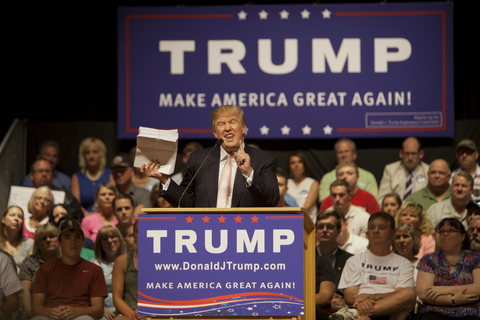|
© Lightpainter | Dreamstime.com - Donald Trump Photo
America is going through a socio-political, economic exorcism. Donald Trump and his troop are coming out of America’s bosom, exposing the decadent side of our American nature.
And, that’s just what the exorcist ordered. The imps of racism, fascism, demagoguery, xenophobia and anti-intellectualism are aggravated, because America has changed for the better. We are witnessing a natural, adverse reaction to the Obama Phenomenon. Essentially, Trump’s impassioned entourage is an outgrowth of exploited social, political, and economic grievances, the rise of the Tea Party, extreme Republican obstructionism, and the reckless fanning of apocryphal claims against Barack Obama.
What is the Obama Phenomenon?
It was an omen. The Obama Phenomenon signaled that more than half of the American electorate decided to face the social, political and economic demons that obstructed the consecrated democratic ideals in the Declaration of Independence. The “Yes We Can” chant invoked a movement to sanctify the City on a Hill and renew its promises of freedom, justice, and peace. Americans who voted for Obama want a multicultural democracy, a post-racial society, an accountable Wall Street, better healthcare service and educational resources, equal rights for the LGBT and women, a reduction of aggressive military campaigns in Middle Eastern and Third World countries around the world, among other goals. Obama, no doubt, represented these solemn demands. Even his critics knew it. The authors Aaron Klein and Brenda J. Elliot of the anti-Obama book The Manchurian President knew that “Obama had not borrowed the ‘movement’; the ‘movement’ was empowering Obama.” Obama indeed was a gladiator for his electorate. The movement that lifted Obama to the Oval Office brewed resentment from copious Americans on the Right, ranging from the working class up to the wealthy and power elite. However, the voting blocs that supported and opposed Obama reveal the major underlying demographics and sentiments against him. For example, according to the Pew Research Center, Obama with 43% lost the overall white vote to Senator John McCain’s 55% in 2008. Whereas, among black voters, Obama received 95% and McCain 4%; among Hispanic voters, Obama won 66% and McCain 32%. Obama even won the majority of Americans with post-graduate degrees. The major source of the backlash to Obama and the force of Trump’s ascendancy among Republican voters resides in these stats and others, and they illuminate the demographic and ideological nuances of Obama’s own constituency and that of his opposition. So exactly where did the backlash come from? We should remember that the presidential duel between then Senators John McCain and Barack Obama was no dirtier or politically combative than past presidential campaigns in the history of the United States. In fact, “neither had any inclination to turn the election into another bitterly polarized knife fight,” John Heilemann and Mark Halperin report, in their book Game Change. As all campaigns do, theirs did get contentious, especially because “there was one minor hitch . . . McCain and Obama didn’t like each other. Not even one bit.” (Game Change). But both candidates stayed within the usual limits of political mudslinging. However, the message of Obama’s campaign was felt as a shockwave that threatened to irreversibly change a country dear to many American citizens. Let’s face it, all the Presidents before Obama were white men. But I must make it clear that Obama’s blackness, alone, is not the whole problem. Along with the racial overtones his dark skin and African heritage echoed, it is the progressive, liberal movement to the left he champions. That is what many Conservatives generally oppose, and more important, that is what radicalized twenty-six percent of the American population—the notorious Tea Party. The Tea Party grew out of various coalescing malignant strands of discontent. I’m not saying the only people who dislike Obama are from that caucus. In fact, some non-Tea Partiers on the Right, Independents, libertarians, including affiliates on the Left, arguably have more antipathy towards him. The point is that the Tea Party is symbolic of the origins of the baleful rhetoric and animus aimed at Obama, which fueled the ascendancy of the Trump Party. Living through the political and economic vicissitudes in the eight years before Obama’s term, people had every right to be angry at someone. After interviewing countless Obama detractors, Will Bunch in his book The Backlash notes that along with “old-fashioned racism” Obama’s antagonists also suffered from “new-fashioned and genuine” woes resulting from prolonged wars, a collapsed economy, a desiccated workforce, and a “political system” feeding the financial appetites of the “elite class.” How did the backlash convert into the “Make America Great Again” slogan? The GOP exploited the outrage of the Tea Party and other Americans who felt that someone or something is stealing their American Dreams. Nearly every Republican leader knew that Obama is: not responsible for 9/11 or the Iraq and Afghanistan Wars, not the cause of the Great Recession, not a Muslim plotting with terrorists, not the Antichrist, not a communist, not coming after American people's guns, not raising an underground Army, and other aspersions. They knew he loved America and even appreciated some of their Conservative principles. But instead of taming the burgeoning unreasonable hatred and crackpot fear of Obama, the GOP fanned the flames. Who could blame them, though? Even by 2008 it might have been too late and not worth risking their voters. Senator McCain was booed by his own supporters when he tried to mediate the undue fears of Obama during a campaign speech. He paid a price for saying: “I want to be President of the United States, and I do not want Senator Obama to be. But I have to tell you, I have to tell you, he is a decent person and a person that you do not have to be scared [of] as President of the United States.” Soon the Tea Party would threaten to sabotage any Republican who dared to speak reasonably about Obama. Eventually the GOP was dragged further right, and its political rhetoric became extremely vulgar by 2011. As obdurate and disrespectful to Obama they could, the Republican leaders were unable to satisfy the craving for disillusioned Obama-hate and assuage the general vexation of a formidable voting bloc within their ranks. . . . Donald Trump enters from "Left" stage . . . Journalist and author Will Bunch was probably the first to discern the portent opportunity the Tea Party created for an alpha-white male, bombastic, reality-TV megalomaniac, billionaire. Commenting on Trump’s bid for the White House in 2011, Bunch explains: “Politics abhors a vacuum every bit as much as nature, and into the GOP’s yawning cavern in the spring of 2011 strolled a man . . .. For several weeks, Trump went on national TV, day after day after day, repeating the worst and most easily disprovable lies about the forty-fourth president's supposed non-U.S. citizenship . . .. The result: several polls showed Trump skyrocketing to the front of the GOP primary field. . . . Trump’s 2016 Bid . . . When Trump entered the 2016 race, he picked up from where he left off in first run. This time he not only aimed his calumnies at Obama, he targeted his Republican competitors as well. Like Taz, the Looney Tunes Tasmanian devil, he tore asunder the Grand Old Party, which not too long ago gave him a warm reception. Trump appeals to the deepest and darkest ideological passions of the Republican voters. Indeed, the most notable is a racist-bigotry blend. However, truth be told, that is not the only passion Trump incites. Some people genuinely believe that Trump’s business experience will help him win good deals for America, making it great again. Interestingly, the second, and probably the most significant, reason why Trump has a huge loyal platoon of voters is the devastated American workforce. Americans want jobs—especially, those good old American factory jobs they lost in the past three to four decades. And Trump, a man with his own wealth, betrothed to no special interest group like the other Republican candidates, promises to bring back those good old minimum wage jobs. Thomas Frank in his Huffington Post editorial says it best: “But there is another way to interpret the Trump phenomenon. A map of his support may coordinate with racist Google searches, but it coordinates even better with deindustrialization and despair, with the zones of economic misery that 30 years of Washington’s free-market consensus have brought the rest of America.” So there you have it. Trump’s campaign is the result of the Republican establishment’s reluctance: 1) to sincerely face and embrace the Obama Phenomenon, 2) to discard the malignant elements of the backlash to Obama’s election (some aspects of the backlash were valid), and 3) to support Obama’s measures for the American workforce and expand educational opportunities to equip Americans for a rapidly transforming, competitive global economy. The Exorcism The “Make America Great Again” slogan is the 2008 “Take America Back” shibboleth on steroids. As I tried to convey, the 2016 Trump campaign is a deep expression of fear, frustration and despair. Change towards pluralism, fiscal accountability, education, diplomacy, multiculturalism, and globalization have summoned the ideological demons out of the bellies of people who are anti-illegal immigrant (although illegal immigration America is at a 40-year low), anti-Muslim (although domestic terrorists kill more Americans than terrorists), anti-Iran Deal (although Iran is removing their nuclear stockpile), and broke! We hear their furious howling and see their often bestial tendencies in the Trump rallies. Where do we go from here? There is no quick fix—only “hard choices,” to borrow the title of Hillary Clinton’s book Hard Choices. Do we keep the demons of our past and “Make America Great Again,” or, following the wisdom of our Constitution, decide that “We the People of the United States” are going to face our fears and embrace positive change together “in Order to form a more perfect Union”? Comments are welcome. And, don't hesitate to recommend topics you'd like me to address. Sign up to receive future blog posts and updates on Voting Matters events via email. All subscribers before the release will receive a 20% discount off my upcoming book Voting Matters: Don't Sleep on the Polls.
0 Comments
Leave a Reply. |
About the blogThis is Kasaun's blog on the significance of voting, particularly in America. The goal is to get every American voting in local and national elections. Archives
July 2018
Categories |


 RSS Feed
RSS Feed
